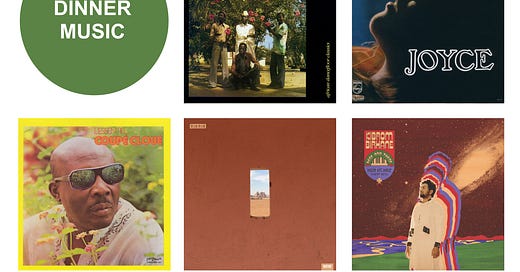This week we’re listening to jazz-inflected lounge, bossa nova, psychedelia, and compas. The sound is soft — pulling from traditional instrumentation of Ethiopia, Haiti, Brazil, Anatolia and Guinea while melting the arrangements with modern and Western elements of jazz, funk, and soul. Many evoke “oceanic feeling,” drifting through genres and regions while moving above and beyond them.
We begin with Objectif Perfection by Balla et ses Balladins, an orchestra formed in the wake of post-independence Guinea in the early 60s by the national government. The group played a key role in shaping the country’s modern sound, blending traditional Manding melodies with Cuban-inspired rhythms and were treated, and paid, by Guinea as public servants, much like postal workers or teachers. The album is a fusion of traditional West African music with Latin rhythms, i.e. Afro-Cuban, and has a softness that is defined by the sharpness of the melodies. There’s a really great house edit of the track, Paulette, that you shouldn’t miss. We move into Joyce Moreno’s debut eponymous album — very much a part of Brazil’s 1970s MPB (música popular brasileira) movement, in which artists looked beyond bossa nova to other Brazilian genre’s for inspiration, like samba and baião. Moreno’s voice is lush and sophisticated, threading the acoustic intimacy of bossa with the swing of samba. This is a stunningly sweet and gentle album. Next, we have L'essentiel by Coupé Cloué, a quintessential compas album (we’ve looked at compas before in Dinner Music 118). The album itself is upbeat, flecked with soft merengue, yet tinged with the sunny melancholy of island living. The album also pulls from the French chanson style—essentially cathartic ballads—and together the genres make a distinctly Haitian album. We move eastward with Eje Eje’s Five Seasons, an instrumental album that “seemed to have squeezed in some Desert Blues into their psych rock funk with some Turkish trad folk, Levantine dabke and Persian bandari.”1 Eje Eje is the solo project of Itamar Klüger, one of Şatellites (Dinner Music 122), and challenges the westernization of sound, and culture, by structuring the album around the seasons of the Chinese calendar, winter, spring, summer, end of summer, and fall. End of summer is an “elemental earth” season and tends to be short and transitory. We end with Here And There by Kibrom Birhane, an album that builds on traditional Ethiopian Orthodox music and jazz.
Enjoy.




